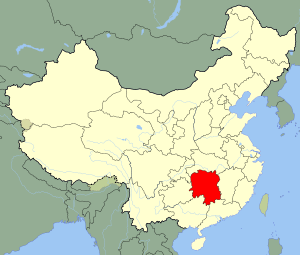Chenzhou train collision
 | |
| Date | June 29, 2009 |
|---|---|
| Time |
02:34 CST 18:34 UTC |
| Location | Chenzhou, Hunan province |
| Country | People's Republic of China |
| Rail line | Jingguang Railway |
| Operator | China Railways, Guangdong Railway Group |
| Type of incident | Derailment |
| Cause | under investigation |
| Statistics | |
| Trains | 2 |
| Deaths | 3 |
| Injuries | 60+ |
The Chenzhou train collision (Chinese: 湖南郴州列车相撞事故) occurred on June 29, 2009, at Chenzhou railway station in Hunan province, China, when two passenger trains collided, leaving at least three people dead and 63 injured.[1] The crash occurred at 02:34 local time, between express trains numbered K9017 and K9063.[2] A brake failure is reported to have caused the crash, although this has not been confirmed.[3] An investigation has been launched.
Accident
The accident occurred on the Jingguang railway, one of China's principal trunk lines. Train K9017 was an express K-class passenger train departing from Changsha, the capital of Hunan province, to Shenzhen, Guangdong. At around 02:34 local time, the train pulled into Chenzhou Railway Station at speeds of over 50 km/h, colliding sideways against train K9063 from Tongren to Shenzhen, which had just began its way out of the station. The initial investigation found that K9017 sped into a turning point at the station, ignoring a red light prompting it to stop, and was travelling at a speed of 55 kilometers per hour. The speed led the train to derail. The two train engines and six carriages went off the track. One of the cars crashed into two nearby houses, destroying the structures.
According to the electronic display boards at the station, K9063 was scheduled to enter the station at 02:12 and depart at 02:22, while K9017 was scheduled to arrive at 02:38 and depart at 02:41, meaning the trains should have entered the station at least some 15 minutes apart from each other. Passengers on the K9017 revealed that the train had initially stopped for twenty minutes before arriving at Chenzhou railway station, at around 02:00. There seemed to have been no effort from K9017 in stopping the train as it entered Chenzhou station, which was a scheduled stop. In addition, no precautions were taken by the departing K9063 train. As a result, reports have questioned the validity of the claim that there was a brake failure.[3]
The collision left thousands of passengers stranded at the station.[4]
Casualties
CCTV broadcast that two passengers stayed in intensive care in hospital.[5] Forty-two other people were receiving treatment for minor injuries.[5] Three passengers are confirmed dead from the accident. All were female; two of these were passengers and one was a woman in her dwelling at the time.[6]
Cause
Guangdong Railways Group, the operator of the two services, has blamed the accident on brake failure. This has not yet been confirmed by the Ministry of Railways.[5][7]
Investigation
An investigation was requested by Liang Jiakun, deputy director of the State Administration of Work Safety.[7] The Ministry of Railways launched an investigation.[7] There are no further details.[7]
Reaction
![]() China's Railway Minister Liu Zhijun travelled to the area to look at the rescue operation.[2]
China's Railway Minister Liu Zhijun travelled to the area to look at the rescue operation.[2]
References
- ↑ "Three killed in passenger train collision in C China". Xinhua News Agency. Archived from the original on 2009-07-27. Retrieved 29 June 2009.
- 1 2 "3 dead, 60 hurt in China train collision". USA Today. 2009-06-29. Retrieved 2009-06-30.
- 1 2 "SINA". Archived from the original on 2009-07-27. Retrieved 2009-07-02.
- ↑ "Three killed, 60 injured in China train collision". channelnewsasia.com. Retrieved 2009-06-30.
- 1 2 3 "Crash blamed on brakes". Independent Online. 2009-06-30. Retrieved 2009-06-30.
- ↑ SINA: Confirmed identities of three deaths
- 1 2 3 4 "Brake failure caused fatal train collision in central China: company". Xinhua News Agency. 2009-06-30. Archived from the original on 2009-07-27. Retrieved 2009-06-30.
|first1=missing|last1=in Authors list (help)